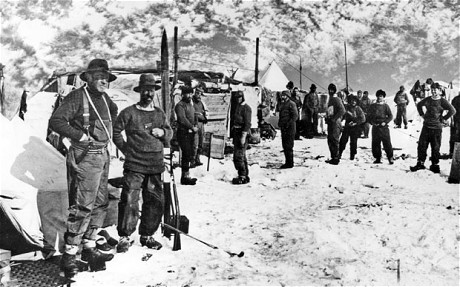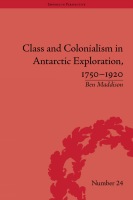
Richard Batten
History Department, University of Exeter
Follow on Twitter @Richard_Batten
Review of Ben Maddison. Class and Colonialism in Antarctic Exploration, 1750-1920. London: Pickering & Chatto, 2014. xii + 247pp. £60 (hardback), ISBN 978-1848934184. ‘Empires in Perspective’ Series.
 The histories of Antarctic exploration have generally tended to focus on the narratives of intrepid explorers such as Ernest Shackleton and Robert F. Scott, who led expeditions of endurance to the arduous polar wilderness of Antarctica. In the view of Ben Maddison, this concentration on the heroism of the Antarctic explorers, who he defines as the Antarctic elite or the ‘masters’, was an understandable consequence of how historians had approached ‘Antarctic history almost exclusively from the rhetoric and records of the masters’ [79]. In Class and Colonialism in Antarctic Exploration, 1750-1920 (2014), Maddison suggests that historians have, unintentionally, strengthened the invisibility of the Antarctic working class because they have been hesitant to engage critically with the voices from below on these expeditions.
The histories of Antarctic exploration have generally tended to focus on the narratives of intrepid explorers such as Ernest Shackleton and Robert F. Scott, who led expeditions of endurance to the arduous polar wilderness of Antarctica. In the view of Ben Maddison, this concentration on the heroism of the Antarctic explorers, who he defines as the Antarctic elite or the ‘masters’, was an understandable consequence of how historians had approached ‘Antarctic history almost exclusively from the rhetoric and records of the masters’ [79]. In Class and Colonialism in Antarctic Exploration, 1750-1920 (2014), Maddison suggests that historians have, unintentionally, strengthened the invisibility of the Antarctic working class because they have been hesitant to engage critically with the voices from below on these expeditions.
Indeed, Maddison argues that it was the ‘gentrification’ of Antarctic exploration in the late nineteenth and early twentieth centuries that further contributed to the silencing of the working class. This despite the fact that the expeditions to Antarctica were ‘facilitated by multifarious labours of the working class’ [6]. Consequently, Maddison claims to fill this historical vacuum by providing a substantial new interpretation of the history of Antarctic expeditions. Continue reading “How the Antarctic Reframes the Context of Class and Empire”

You must be logged in to post a comment.